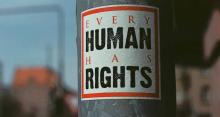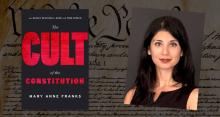
Constitution from Wallpaper Cave (edited); Signers of Declaration of Independence from Wikimedia Commons / Public domain

Constitution from Wallpaper Cave (edited); Signers of Declaration of Independence from Wikimedia Commons / Public domain
This collection of essays and resources explores the role of the United States Constitution in perpetuating racism. While many individuals and groups document inadequacies in the Constitution, this section addresses questions like: How does the structure of the government preserve racism? What kind of government structure will support a multicultural nation without racism? How do we use Article V of the Constitution to transform America?
Sarah Isgur points to the current role of the Supreme Court and the inability of Congress to solve problems. She builds a case for amending Article V of the Constitution. She quotes Justice Scalia who said he "once calculated what percentage of the population could prevent an amendment to the Constitution, and found it was less than 2 percent. ‘It ought to be hard, but not that hard"
Isgur concludes, "He’s right. It’s time to amend the amending process."

A close examination of a 2021 Supreme Court ruling provides a window into one problem with the Constitution. A multi-cultural nation without racism is based on civil rights that ensure the full participation of all identity groups. It is also grounded on human rights that end racism by denying privileges to any person or group. The authors of the Constitution did not intend to establish a nation on principles of human rights. This needs to be fixed.

“The Cult of the Constitution” is a very provocative discussion of the U.S. Constitution. Franks observes: “We are facing a continuing crisis of constitutional inequality. For more than two hundred years, the lion’s share of legislative, judicial, political, and social resources has been devoted to protecting the constitutional rights of white men above all others ... It is hardly surprising, then, that the picture of who holds power today does not look that different from 1787.” Her critique of the Constitution is convincing.
This 2017 article summarizes "resolutions that call for a convention to propose amendments to the U.S. Constitution to require a balanced federal budget, and possibly to shrink federal authority in other, often unspecified, ways. Proponents of these resolutions claim that 28 of the 34 states required to call a constitutional convention already have passed such resolutions." Recognizing the threat that exists to our democracy is an important first step in committing to the work rewriting the Constitution so it supports a multicultural nation without racism.
There’s a lot wrong with America’s political system, and lots of debate about ways to fix it... What if it turns out that it’s gridlock and partisanship that open a path for constitutional reform?